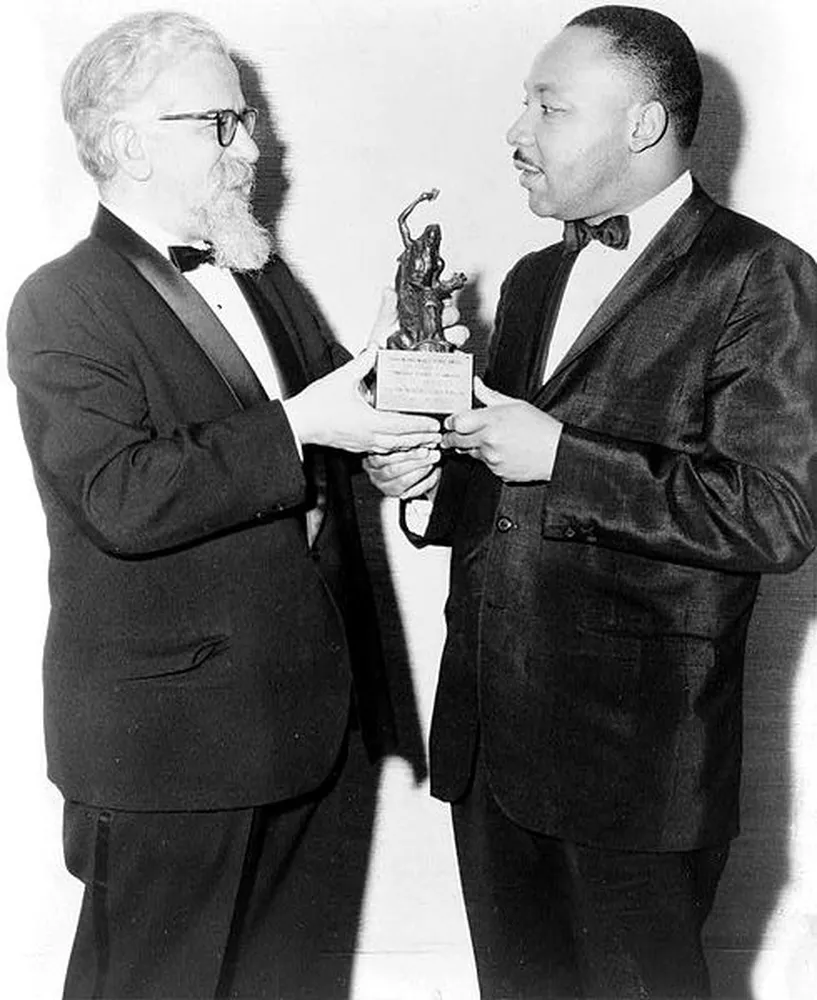
On the occasion of Yom Kippur, WILL Radio’s “The 21st” hosted an episode reflecting on religion and racism. The host interviewed Rabbi Ari Naveh (Illini Hillel) and our own Professor Brett Ashley Kaplan (Comparative & World Literatures and Director of Holocaust, Genocide, and Memory Studies). The conversation centered on the life and work of Rabbi Abraham Joshua Heschel and what we can learn from him about race, religion, and generally making the world a better place—what some of us might refer to as tikun olam.
Rabbi Abraham Joshua Heschel was born in Warsaw in 1907 and moved to Germany in the 1930s. He accepted a position at the Judisches Lehrhaus in Frankfurt in 1937, “just at the wrong time to be a Jewish professor in Germany,” as Kaplan puts it. He relocated to London and then to the United States, where he was first affiliated with Hebrew Union College in Cincinnati and then the Jewish Theological Seminary in New York. During his years in the US, Rabbi Heschel worked extensively for the betterment of society and to combat racism, participating extensively in the Civil Rights movement and collaborating with Dr. Martin Luther King Jr. One of the highlights of Rabbi Heschel’s work was a famous speech that he gave at the National Conference on Religion and Race in Chicago in January, 1963—a meeting that Rabbi Heschel described as the secondconference on religion and race, the first having been conducted by Moses and the Pharaoh a few years earlier…In his speech, Heschel emphasized the evils of racism against any/all peoples and the imperative within Jewish theology to fight against such injustices. Drawing examples from Jewish history, Heschel insisted on the need for greater global justice, suggesting that it had been easier for the Jews to cross the red sea in ancient Egypt than for a person of color to cross a modern-day university campus. He lamented the persistence of discrimination despite far too many object lessons that evince its consequences:
“How many disasters do we have to go through in order to realize that all of humanity has a stake in the liberty of one person; whenever one person is offended, we are all hurt. What begins as inequality of some inevitably ends as inequality of all.”
(http://voicesofdemocracy.umd.edu/heschel-religion-and-race-speech-text/)
In the WILL interview, Rabbi Ari (as he is generally known) and Professor Kaplan discuss Rabbi Heschel’s work, its relationship with the central themes of Yom Kippur, and the lessons we can still draw from his teachings today. Rabbi Ari describes connections between the concept of tshuva (repentance or atonement, which is literally derived from the Hebrew verb “to return”) and the commitment to do better as a community. Citing Ta-Nehisi Coates, Rabbi Ari examines how Heschel can help us to understand structural racism and engage in collective reckoning. He also expounds on Maimonides’s assertion that tshuva requires, not just repentance for past failings, but a commitment to do better going forward:
“If all you do is sit and ponder what you’ve done in the year past, if it doesn’t come with actual action and the thought process to really think through how you’re going to avoid those behaviors and those actions from the year’s past, then [tshuva] is only half-accomplished.”
Speaking from her perspective as a scholar of the Holocaust and of comparative critical race studies, Kaplan describes how Heschel’s world view was shaped by his life experiences:
“Heschel’s whole life was upended by the Holocaust. Members of his family were murdered, his community was destroyed, and he had to relocate to the U.S. in order to survive. He saw first-hand what both hatred and indifference could create: genocide. He and many of the other Jews who joined the civil rights movement were compelled to speak out and act out against oppression because of what they or their parents or relatives had experienced during the war so there is a direct line between the Holocaust and many Jewish activists' reasons for speaking out. “
Professor Kaplan characterizes Heschel’s work, moreover, as a call to action, citing how contemporary issues and struggles can be informed by his teachings and example:
“After Trump’s travel ban was announced, a group of rabbis was arrested in New York while protesting it and Rabbi Jill Jacobs said: 'We remember our history, and we remember that the borders of this country closed to us in 1924 with very catastrophic consequences during the Holocaust. We know that some of the language that’s being used now to stop Muslims from coming in is the same language that was used to stop Jewish refugees from coming.' As was Heschel, rabbis today are keenly aware, because of the memory of the Holocaust, and because of the ethical teachings embedded in much of Jewish thought, of the consequences of ignoring injustice.”
Kaplan also explores the meaning of Yom Kippur and collective reckoning for her as a secular individual and references several examples of how she and her family strive to respond to the “call to action” offered by Abraham Joshua Heschel’s words and deeds.
****
The full interview is available on the WILL The 21st (https://will.illinois.edu/nfs/21st_091818_full_edited.mp3). The episode is entitled, “One Year Since Hurricane Maria; Reconciling with Racism on Yom Kippur.” The interview with Kaplan and Naveh begins approximately 35 minutes into the episode.
****
Want to delve deeper into the relationship between Jewish cultural practices and a commitment to forging a better, more just world? If so, please note this year’s Oscar and Rose A. Einhorn lecture on April 1st by Jewish Studies scholar (and former University of Illinois professor) Adam Sutcliffe, whose new book explores the historical evolution of the concept of tikun olam.